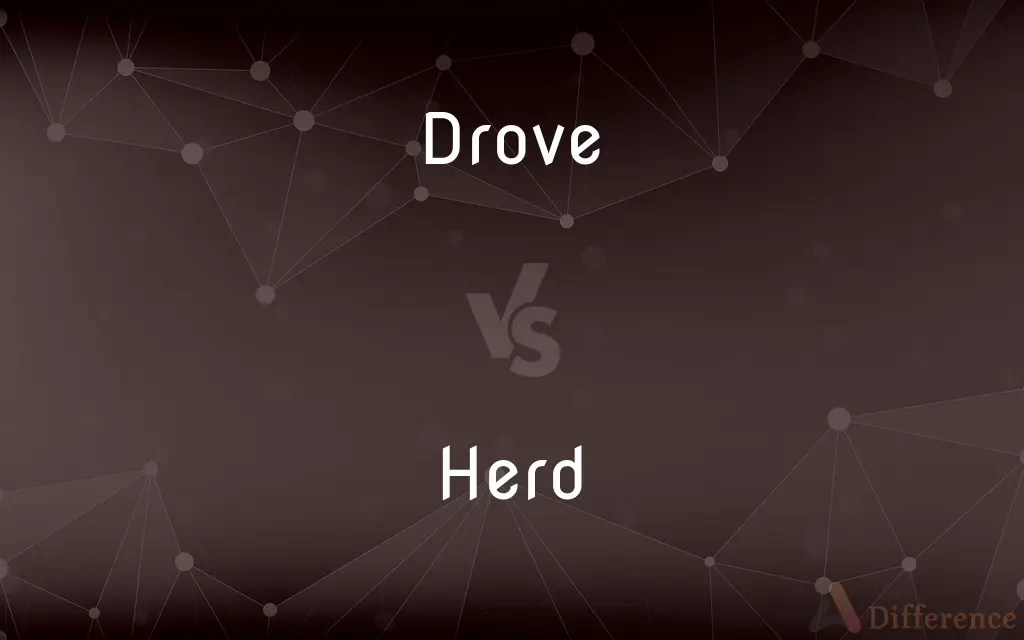Drove vs. Herd — What's the Difference?

Difference Between Drove and Herd
ADVERTISEMENT
Compare with Definitions
Drove
Past tense of drive.
Herd
A herd is a social group of certain animals of the same species, either wild or domestic. The form of collective animal behavior associated with this is called herding.
Drove
A flock or herd being driven in a body.
Herd
A group of cattle or other large herbivorous mammals of a single kind kept together for a specific purpose.
Drove
Often droves A large mass of people moving or acting as a body
People moving through the streets in droves.
ADVERTISEMENT
Herd
A number of wild animals of one species, especially large herbivorous mammals, that remain together as a group
A herd of elephants.
Drove
A stonemason's broad-edged chisel used for rough hewing.
Herd
A large number of people; a crowd
A herd of stranded passengers.
Drove
A stone surface dressed with such a chisel.
Herd
The multitude of common people regarded as a mass
"It is the luxurious and dissipated who set the fashions which the herd so diligently follow" (Henry David Thoreau).
Drove
A cattle drive or the herd being driven by it; thus, a number of cattle driven to market or new pastures.
Herd
To come together in a herd
The sheep herded for warmth.
Drove
A large number of people on the move (literally or figuratively).
Herd
To gather, keep, or drive (animals) in a herd.
Drove
(collective) A group of hares.
Herd
To tend (sheep or cattle).
Drove
A road or track along which cattle are habitually driven; a drove road.
Herd
To gather and place into a group or mass
Herded the children into the auditorium.
Drove
A narrow drain or channel used in the irrigation of land.
Herd
A number of domestic animals assembled together under the watch or ownership of a keeper.
A herd of cattle
A herd of sheep
A herd of goats
Drove
A broad chisel used to bring stone to a nearly smooth surface.
Herd
Any collection of animals gathered or travelling in a company.
Drove
The grooved surface of stone finished by the drove chisel.
Herd
A crowd, a mass of people or things; a rabble.
Drove
To herd cattle; particularly over a long distance.
Herd
Someone who keeps a group of domestic animals; a herdsman.
Drove
(transitive) To finish (stone) with a drove chisel.
Herd
(intransitive) To unite or associate in a herd; to feed or run together, or in company.
Sheep herd on many hills.
Drove
Of Drive.
Herd
(transitive) To unite or associate in a herd
Drove
A collection of cattle driven, or cattle collected for driving; a number of animals, as oxen, sheep, or swine, driven in a body.
Herd
(transitive) To manage, care for or guard a herd
He is employed to herd the goats.
Drove
Any collection of irrational animals, moving or driving forward; as, a finny drove.
Herd
(intransitive) To associate; to ally oneself with, or place oneself among, a group or company.
Drove
A crowd of people in motion.
Where droves, as at a city gate, may pass.
Herd
To act as a herdsman or a shepherd.
Drove
A road for driving cattle; a driftway.
Herd
(transitive) To form or put into a herd.
Drove
A narrow drain or channel used in the irrigation of land.
Herd
(transitive) To move or drive a herd.
I heard the herd of cattle being herded home from a long way away.
Drove
A broad chisel used to bring stone to a nearly smooth surface; - called also drove chisel.
Herd
Haired.
Drove
To drive, as cattle or sheep, esp. on long journeys; to follow the occupation of a drover.
He's droving now with Conroy's sheep along the Castlereagh.
Herd
A number of beasts assembled together; as, a herd of horses, oxen, cattle, camels, elephants, deer, or swine; a particular stock or family of cattle.
The lowing herd wind slowly o'er the lea.
Drove
To finish, as stone, with a drove or drove chisel.
Herd
A crowd of low people; a rabble.
But far more numerous was the herd of suchWho think too little and who talk too much.
You can never interest the common herd in the abstract question.
Drove
A group of animals (a herd or flock) moving together
Herd
One who herds or assembles domestic animals; a herdsman; - much used in composition; as, a shepherd; a goatherd, and the like.
Drove
A moving crowd
Herd
To unite or associate in a herd; to feed or run together, or in company; as, sheep herd on many hills.
Drove
A stonemason's chisel with a broad edge for dressing stone
Herd
To associate; to ally one's self with, or place one's self among, a group or company.
I'll herd among his friends, and seemOne of the number.
Herd
To act as a herdsman or a shepherd.
Herd
To form or put into a herd.
Herd
A group of cattle or sheep or other domestic mammals all of the same kind that are herded by humans
Herd
A group of wild animals of one species that remain together: antelope or elephants or seals or whales or zebra
Herd
A crowd especially of ordinary or undistinguished persons or things;
His brilliance raised him above the ruck
The children resembled a fairy herd
Herd
Cause to herd, drive, or crowd together;
We herded the children into a spare classroom
Herd
Move together, like a herd
Herd
Keep, move, or drive animals;
Who will be herding the cattle when the cowboy dies?
Share Your Discovery

Previous Comparison
Sugar vs. Jaggery
Next Comparison
Presto vs. Allegro














































